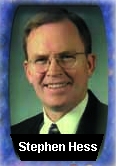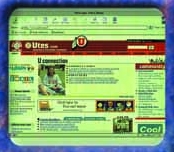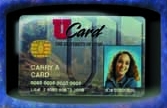
VOL. 10 NO. 3 THE MAGAZINE OF THE UNIVERSITY OF UTAH WINTER 2000
Continuum
Home Page - University of Utah Home
Page - Alumni Association
Home Page
Questions, Comments -
Table of Contents
CYBER CAMPUS
E-commerce possibilities at the U explode, creating a new off-site campus: cyberspace.
By Anne-Marie Wright
It used to be that all the University of Utah's business was conducted on campus, with students and faculty converging in classrooms, books physically checked out of the library, and tuition paid in a single office after standing in a long line. Not any more.
 With
the Internet revolution, the University's domain has expanded beyond its
campus borders, allowing people living in Russia to take courses, alumni
worldwide to keep in touch, and students to check their grades, get reserved
reading materials, or pay their fees online.
With
the Internet revolution, the University's domain has expanded beyond its
campus borders, allowing people living in Russia to take courses, alumni
worldwide to keep in touch, and students to check their grades, get reserved
reading materials, or pay their fees online.
The use of the World Wide Web is not new at the U. Some 500,000 Web pages, including those of faculty and students, already exist on campus. Ninety percent of students currently register via the Web. And e-mail has surpassed the telephone as the primary mode of communication, both on campus and nationally.
In an effort to organize e-commerce possibilities and take advantage of their potential, President Machen appointed Stephen H. Hess BS'73 MS'74 PhD'78, assistant academic vice president of the U and executive director of the Utah Education Network, to chair an e-commerce committee. The committee's mandate was "to study, suggest recommendations, and outline a strategic direction for the campus to pursue in e-commerce issues."
So far, the committee has spearheaded numerous e-commerce applications, providing valuable services to students, faculty, alumni, and staff.
"We do not view e-commerce at the U as a project," Hess says. "Instead, we view it as becoming the essence of how the University will conduct a major portion of its business. It will bring about greater efficiencies and the potential to save money.
"As the Internet erases boundaries, the U will need to swim in the whole sea. We won't have the geographic isolation that has existed, and there's going to be greater competition."
He adds, "As time goes on, it will be absolutely essential for a person to be on the Internet to survive. The only drawback is the social one. Will people sit in front of their computers to pay bills, go to classes, watch movies, listen to music, and never leave their rooms?"
As e-commerce blossoms, that may be entirely possible. But despite social drawbacks, the upside is too great to neglect, Hess says.
"The access, efficiency, improved communication, and personalized approach will broaden the educational experience, customize it, and make it incredibly relevant to business, industry, and the community at large," he says. "The U has to move in that direction or be an island of obsolescence in many respects."
This semester, a number of new electronic services have been put in place.
zUtes.com
The Alumni Association has contracted with zUniversity.com to create a portal Web page for U of U alumni called zUtes.com. The site offers local and campus news, sports scores and headlines, and links to other U Web sites. It also provides alumni with free lifetime e-mail accounts, a place to set up chat rooms, and a career center.

"First and foremost, we want to establish a community for our alumni. Now we have a place they can come to get alumni news, campus news, and information about alumni events," says John Ashton BS'66 JD'69, executive director of the Alumni Association. "Second, we can make some money for alumni programs and scholarships."
Under the contract with zUniversity.com, the Alumni Association receives a cut of revenues generated from shopping conducted through the site, banner advertising, and partnerships with national companies. zUniversity.com also pays three people to work on the U's site. They promote the page, garner advertising, and collect and post news daily, keeping the site "fresh and crisp," Ashton says.
Many national advertisers have already signed on with zUniversity.com, and negotiations are underway with regional companies, says John Fackler BS'89 BS'94 MPRA'95, director of business relations for the Alumni Association. "We have veto power over the advertising that appears on our page, however," he adds.
"We picked zUniversity because we felt they were the best at providing services for universities. They also have strong financial backing," Fackler says. "They have devoted a lot of resources for marketing this site, and if anyone clicks on the advertisers, we make money. We make even more if they buy something."
"It's basically a sharing of revenue. We don't get anything that we don't share with the Alumni Association," says Laura Berge, senior manager of university relations for zUniversity.com. "Plus, the Alumni Association does not pay for our services. We commit the marketing dollars, and we work with John Ashton and John Fackler to decide how to spend that budget."
If alumni make zUtes.com their home page, simply opening the page generates revenue for the Alumni Association because data for advertising revenues is based on how long the banner ads are being displayed, Berge says. zUniversity.com does not sell names or addresses, so alumni do not have to worry about being deluged by junk mail, she adds.
zUtes.com does not take the place of the other alumni Web site, the .edu site connected with the U's Web presence. As a commercial site, zUtes.com merely enhances that, Ashton says, allowing alumni to have their own personalized ports of entry.
"We provide very easy links for alumni to get to other sites on campus as well as the ability to personalize their pages with their favorite stocks, links, and campus information," Berge says. "This site could really be their one-stop shopping for Utah."
"This is really an exciting development," says Randy Dryer BS'73 JD'76, president of the Alumni Association Board of Directors. "We want the Alumni Association to become more electronically savvy and use the Internet more to communicate with its members. It's a great way to keep in touch."
U Cards
As part of the overall e-commerce plan, the U issued all students, faculty, and staff "U cards" to be used in place of ID cards. In addition to magnetic strips, the U cards have embedded chips that can be magnetically coded. Students will be able to check out library books, gain access to residence halls, and carry downloaded money to be used at on-campus eateries, vending machines, copiers, and ticket outlets. The cards also have enough memory to record digital signatures that could be used to replace traditional signatures on anything that needs to be signed, including purchase orders and registration forms. Digital signatures are already required on applications for federal grants.

"Legally, a digital signature can be used anywhere a signature is required," says Teri Olsen, manager of Administrative Computing Service's Web team. "It is a secure way of identifying yourself and providing legal authorization online."
The U has spent about $600,000 on the upgraded ID system, with $500,000 used to set up and distribute the U cards, and $100,000 used to remodel the U Card Center in the Union Building, according to controller Grant Moulton BS'67.
"It's a new platform that will be used to help move the U into the 21st century," Moulton says. "We're taking advantage of new technology as it develops."
UofU.net
This term, the U also announced the launch of its official Internet and Campus Network Service, UofU.net. Students, full-time staff and faculty, and friends of the U who live off-campus can now access the U's network through a Virtual Private Network (VPN) connection.
"We want the campus to be more personalized and accessible," Hess says. "We also want to keep in contact with students and alumni through the years of lifelong learning opportunities."
Owned by and operated under the direction of the U, UofU.net offers remote access to all the U's computing services, including those currently restricted to the campus community-such as library resources, student records, and registration. Its biggest benefit is the security the VPN connection provides for data transmitted to and from the University network to off-campus users.
At $12 per month for students and $14.95 per month for faculty, staff, and others, the service is competitively priced and provides access to the U's network from more than 2,200 local dial-up numbers worldwide.
Future Trends
Now that virtually everything the U offers is online, will people still need to come to campus?
"In the future, you will be able to get some degrees without setting foot on campus. Some of our Ph.D.s in social work are already studying mostly online," says Clif Drew, associate vice president for academic affairs. "But you can't go to football games on the Web. People will continue to come here for face-to-face socialization. There is a lot you go to college for besides instruction in courses."
But with its greater flexibility, distance learning allows working adults and students living in rural areas the same access to material as students on campus. By offering courses regardless of time or place, it will allow students to take classes from other schools or merely avoid the parking crunch.
Drew predicts that distance learning will become more popular, but only when it makes sense. "It's got to be done on a case-by-case basis," he says. "Decisions will be made on student needs, content needs, and, in some cases, on faculty capacities. Some faculty may have a particular skill that translates well online, and in other cases their strengths may not be in the online venue."
Almost all of the U's business practices will be conducted online, however. "There will be very few paper processes," Drew says. "All department purchasing, registration, class changes, applications, and financial aid will be done online."
Hess predicts that industries and corporations will have a larger influence on education as the online trend continues.
"I foresee a much broader collaboration between the University, industries, and businesses as we move even more toward an information society," he says. "Businesses could scan who's taking certain courses and recruit them, or industries could get involved in influencing what courses are offered so that prospective employees emerge with relevant skills.
"From where I sit, I see it all coming together, and it is very, very exciting."
-Anne-Marie Wright, a graduate of the Columbia School of Journalism, is a writer in University Marketing and Communications.
Key services that are or will be available online:
- paying tuition
- buying tickets to sporting events or the performing arts
- individual e-mail accounts for students, staff, faculty, and alumni
- personalized, custom portals for students, faculty, and staff
- access to all reading material, schedules, grades, student records
- purchasing of supplies directly from companies, without the need for storage, receiving, and distribution
- application for federal grants
- admissions, registration, career opportunities
- bookstore inventory
- physician portals that include doctors' schedules, patients' records, graphed analyses, x-rays, and a database of possible prognoses based on symptoms and tests
- classes for alumni
|
digital @ libraries.utah.edu Advances in new technology are revolutionizing the U's libraries. To keep pace with the 21st-century knowledge economy, the U is digitizing information to share with the world. "Digitization is a way that libraries can assemble their materials in an attractive way to inform and educate people," says Sarah Michalak, director of the Marriott Library. "The images are so sharp and clear that they're almost real." The World Wide Web allows users to access digitized journals, photographs, and special collections-some dating from the 1600s-and to interact with this information at a distance. On its home page of special collections, http://www.lib.utah.edu/spc/, a link is provided to the photo archives, the library's largest collection of digitized materials. "The greatest advantage of digitization is to give people around the world access to the rich special collections that only we own," says Kenning Arlitsch, head of Marriott Library's Digitization Center. "It increases our status as a research institution." The Marriott Library has made digital facsimiles of a 1661 second edition of Harmonia Macrocosmica by Andreas Cellarius. Text and color plates from this "atlas of the heavens" are now available online, displaying theories of the cosmos from ancient times to 1661, Arlitsch says. The library is also working on a collaborative project with Brigham Young University to provide online access to diaries and maps from pioneer treks dating from 1841 to 1866. It also digitizes several journals that are published on campus, including the Hinckley Journal of Politics and the Center for Teaching & Learning Excellence (CTLE) Journal. These and other digitized projects can be accessed at http://www. lib.utah.edu/digital/. One obvious benefit of digitization is that it reduces the handling of special collections, which are often old and fragile. Although preservation is a main goal, Arlitsch says that digitization often increases awareness, which results in more people coming to see special collections in person. Online exhibits also are becoming popular among libraries. In the past, photos, text, and relics were viewed by libraries' walk-in patrons. Now digitized exhibits are available for greater circulation and as permanent resources for teaching and research. "Online, the information and photos are so crisp, so attractive, and so enjoyable to move around in," Michalak says. "We're building a repository of images and information for faculty, whether they're teaching online courses or not." Digitization has transformed the health sciences as well. The "Slice of Life" project at the Eccles Health Sciences Library, for example, provides digitized pictures of diseased tissue that faculty now routinely use in teaching basic medical courses. Despite its advantages, digitization is expensive. Arlitsch says there is some discussion about whether the library should sell copies of its collections to help defray costs, a notion contrary to a library's traditional role of circulating free information. Currently, the library contracts with entities that pay the library to digitize outside collections. The Eccles Library has formed a fee-based international partnership with the country of Cyprus, whereby the library delivers via e-mail articles that physicians in Cyprus have requested and paid for. "Everything is changing," Michalak says. "There are so many interesting possibilities."
-Anne-Marie Wright |
Continuum Home Page - University of Utah Home Page - Alumni Association Home Page
Questions, Comments - Table of Contents
Copyright 2001 by The University of Utah Alumni Association